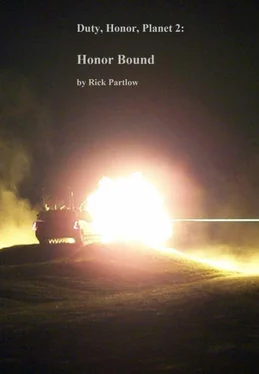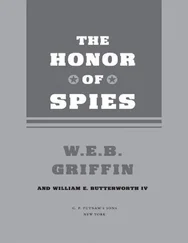Fourcade sat back, steepling his hands thoughtfully, as if considering his words carefully before he continued.
“There is,” he finally said, “one option that would satisfy our needs and your requirements, Mr. President. I hesitate to bring it up, because I’ve heard of your opinion on the matter… but Senate Measure 1143B has the potential to provide us with a ready and problem—free labor force without exploiting the masses, as it were.”
O’Keefe took a deep breath, trying to keep it from turning into a shudder as he gathered his thoughts to make a coherent objection rather than the vehement “Fuck no!” that threatened to burst past his pursed lips. He fought back nightmare images of superhuman soldiers hulking in camouflaged battle armor and of pale, blue faces with black, shark’s eyes.
“I am uncomfortable,” he finally said, “with the idea of creating a possibly intelligent slave race out of human DNA.”
“We’ve been working on sentient computer systems for decades,” Fourcade pointed out. “I haven’t seen any angst over the possible use of those for our needs. If our labs were given the go-ahead to experiment with the creation of the sort of biomechanical constructs that the Protectorate used against us, they could make certain that the results weren’t sentient by restricting the amount of brain tissue we used. Sure, we would be working from human tissue samples, but we’re not talking about cloning human beings… these would be meat robots, basically.” He shrugged. “They would just be much cheaper to make and maintain than ones made from artificial materials.”
“And if the technique for producing these… things,” Zakharova said with distaste in her voice, “becomes widespread, we could wind up with someone trying to do the same thing Antonov did and using them as a ready-made army. There are some huge ethical, legal and practical considerations to this sort of enterprise that you are oversimplifying.”
” Any solution to this problem will be complex and problematic,” Fourcade shook his head. “But the problem won’t go away because we don’t like any of the possible solutions. We need those resources and if we’re going to maintain an interstellar civilization, we need them as cheaply as possible. If we don’t get them… well, sir, you will be remembered as the President who oversaw the retreat of humanity from the stars, because the colonies will wither on the vine.”
“Mr. Fourcade,” O’Keefe stood, prompting Zakharova and Fourcade to do likewise, “I am sure that we will be able to solve this problem and prevent that from happening. We will be sure to keep the lines of communication open and perhaps I can task my science advisors with finding out how feasible the limitations you mentioned can be.”
“Thank you very much for your time, Mr. President,” Fourcade shook his hand, taking the hint. “I’ll relay your concerns to the board of directors and possibly we can come up with some ideas of our own.”
“I’ll walk you out, Mr. Fourcade,” Zakharova offered, putting a guiding hand on his shoulder and leading him out through the ornate wooden door.
O’Keefe sank back into his chair, feeling infinitely weary. Taking a deep breath, he touched a screen set into his desktop.
“Send in Colonel McKay.”
O’Keefe’s expression didn’t quite brighten when McKay entered the room—he knew why the officer was visiting and it wasn’t pleasant news—but he did feel some of the weight lift from his shoulders. McKay wasn’t quite a friend, but he was certainly an ally and whatever their philosophical differences, he knew that he could count on the man to do his duty, no matter how heavy the responsibility.
“Mr. President,” McKay shook his hand. “Thanks for seeing me on such short notice.”
“I’ve seen the video you sent over,” O’Keefe said with a nod, waving McKay into a seat. “So, he’s back.” O’Keefe allowed himself a moment of vulnerability with the military officer that he couldn’t with the lobbyist and rubbed his eyes tiredly. “You thought he would be, eventually.”
“Yes, sir,” McKay said, a frown passing over his lean, squared-off face. There had been quite the debate five years ago, just after the war, when he had pressured then—President Jameson to mount an all—out search for Antonov’s headquarters. He knew that as long as the former Russian dictator was at large with access to the nanotechnological factories from the alien ruins on his headquarters world, he wouldn’t rest until he had come back and finished the job of conquering Earth. Antonov’s cosmonauts had discovered the wormhole gateway to the ruined alien world by accident, during a mining mission to the asteroid belt, but five years of searching for it had produced no results.
“So, the question becomes, how do we respond and how long do we have?”
“I’ve been researching the area of the frontier where the attack occurred,” McKay said. He gestured towards the star map projected in a recess of the back wall behind the President’s desk. “If you wouldn’t mind?”
At O’Keefe’s wave of assent, he stepped over to the projector’s controls and brought up a section of the Republic’s inner frontier—towards the galactic center rather than away from it. “Here’s the system where the observation post was attacked,” he indicated a main sequence star in the near center of the sector. “We don’t have any manned bases farther in than this, but we have done surveys in a few systems nearby, both manned and unmanned.” He traced an arc of stars in a half-circle around the original one. “There’s a couple with habitable worlds and the early indications are they’re rich in natural resources. I’m wondering if he isn’t working one or more of those worlds for resources and wiped out the observation post so we wouldn’t get wind of what he was doing until it was too late.”
“So it may be too late to catch him,” O’Keefe muttered sourly. “Damn, I hate having him out there like a Sword of Damocles.” His eyes narrowed and he looked at McKay suspiciously. “You could have told me all this via videoconference from Fleet Headquarters. You’re here because there’s something you wanted to ask me in person.”
“Yes, sir,” McKay admitted, looking him in the eye. “I want to go out there. I need to supervise this personally.”
“McKay, in case you hadn’t noticed, you’re the head of the Fleet Intelligence Service,” O’Keefe couldn’t help but smile. “You have people to do this sort of thing for you now.”
“I do, sir, and I trust them, but this isn’t a question of proper training or judgment… this is a question of experience. I know Antonov better than anyone else in the Republic military… I’ve looked in his eye, and I have a feel for him that no one that works for me does. I could get a sense for the data from reports, but that runs up against the time lag. If there is something further I think needs investigating based on findings from a report, it will take months to get that new investigation on the ground. I have a sense that we don’t have that kind of time.”
“Yes,” O’Keefe nodded slowly. “I see where you’re coming from. Very well, it will raise some eyebrows, but the hell with them. You’ll be on a cruiser to the frontier as soon as you’re prepped. Is there anything else?”
“Yes, sir,” he said. “I want to take Colonel Podbyrin with me.”
O’Keefe raised an eyebrow. “The Protectorate officer you captured during the war?”
“Yes, sir… we captured his ship in the Belt and used it to board Antonov’s flagship. He knows exactly how Antonov thinks. I believe he could help us.”
“Where the hell is he, anyway?” O’Keefe blurted. “In prison?”
Читать дальше












